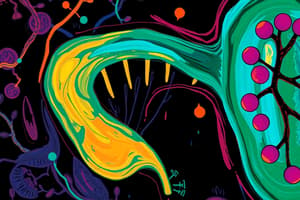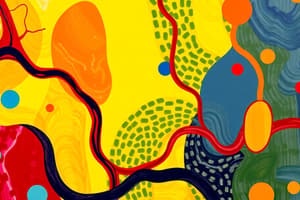Podcast
Questions and Answers
What is the primary source of energy in all living organisms?
What is the primary source of energy in all living organisms?
- Protein
- Fat
- Amino acid
- Glucose (correct)
What is the primary function of insulin in the body?
What is the primary function of insulin in the body?
- To increase glucose uptake in cells (correct)
- To decrease ATP production
- To increase glucose synthesis
- To increase glycogen phosphorylase activity
What happens when there is too much glucose in the body?
What happens when there is too much glucose in the body?
- The brain functions properly
- Insulin secretion is inhibited
- Osmotic water loss and damage to blood vessels occur (correct)
- Gluconeogenesis is stimulated
What is the molecular weight of insulin?
What is the molecular weight of insulin?
What is the effect of insulin on glucose uptake in the brain?
What is the effect of insulin on glucose uptake in the brain?
What stimulates the release of insulin in the pancreas?
What stimulates the release of insulin in the pancreas?
What is the effect of increased glucagon secretion on the body?
What is the effect of increased glucagon secretion on the body?
What is the main characteristic of Type I glucose disorder?
What is the main characteristic of Type I glucose disorder?
What is the term for the excess glucose in the urine?
What is the term for the excess glucose in the urine?
What is a long-term complication of untreated hyperglycemia?
What is a long-term complication of untreated hyperglycemia?
What is a key part of the treatment plan for hyperglycemia?
What is a key part of the treatment plan for hyperglycemia?
What is the molecular weight of glucagon?
What is the molecular weight of glucagon?
What is the effect of glucagon on glucose synthesis?
What is the effect of glucagon on glucose synthesis?
Which of the following factors increases glucagon secretion?
Which of the following factors increases glucagon secretion?
What is the effect of glucagon on glycogenolysis?
What is the effect of glucagon on glycogenolysis?
What is the role of glucocorticoids in glucose metabolism?
What is the role of glucocorticoids in glucose metabolism?
Flashcards are hidden until you start studying
Study Notes
Glucose Metabolism
- Glucose is the major source of energy in all living organisms.
- Too little glucose can lead to brain problems, while too much glucose can cause osmotic water loss and damage blood vessels.
Sources of Glucose
- Food is a direct source of glucose.
- Glucose can be stored as glycogen in the liver and as fat in adipose tissue.
- Glucose can be synthesized from fat and protein through gluconeogenesis.
Pancreas Functions
- The pancreas produces digestive enzymes for digestion.
- The pancreas produces primary messengers (hormones) such as insulin and glucagon.
Insulin
- Insulin is produced by beta cells in the pancreas.
- Insulin structure consists of 51 amino acids, 2 chains linked by disulfide bonds, and a molecular weight of 5800 dalton.
- Insulin increases glucose uptake in nearly all cells (80%), primarily affecting the liver and muscle, but not the brain.
- Insulin receptor is a tyrosine kinase receptor.
- Insulin secretion is stimulated by increased blood glucose, free fatty acids, amino acids, and certain hormones.
- Insulin secretion is inhibited by fasting, somatostatin, and sympathetic stimulation.
Action of Insulin
- In muscle cells, insulin promotes glucose uptake and storage as glycogen, and inhibits glucose synthesis.
- In liver cells, insulin promotes glucose uptake and storage as glycogen, inhibits glycogen phosphorylase, activates glycogen synthase, inhibits glucose synthesis, and promotes excess glucose conversion to fatty acids.
- In adipose tissue, insulin promotes glucose uptake and conversion to glycerol for fat production.
Glucose Disorders
- Type I diabetes: lack of insulin production, characterized by increased fasting blood glucose, increased blood fatty acids and cholesterol, and protein depletion.
- Type II diabetes: insulin receptor insensitivity, characterized by elevated insulin levels and associated with obesity.
- Hyperglycemia: excessive glucose in the blood, leading to polyphagia, polydipsia, polyuria, and slowly damaging blood vessels.
Glucagon
- Glucagon is produced by alpha cells in the pancreas.
- Glucagon structure consists of 29 amino acids and a molecular weight of 3485 dalton.
- Glucagon prevents hypoglycemia by stimulating glycogenolysis and glucose synthesis from amino acids and fat.
- Glucagon exerts its effects through cAMP.
- Glucagon secretion is stimulated by decreased blood glucose, sympathetic stimulation, and stress exercise.
Other Hormones
- Glucocorticoids (adrenal cortex): stimulate gluconeogenesis, inhibit glucose uptake in muscle and adipose tissue, and stimulate fat breakdown in adipose tissue.
- Sympathetic activity and epinephrine: stimulate glucagon secretion and lipolysis.
Studying That Suits You
Use AI to generate personalized quizzes and flashcards to suit your learning preferences.




